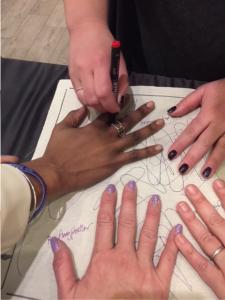Amy Butler and Leslie Copeland-Tune
Okay, ladies. Huddle up.
 We’re having this meeting in the Ladies’ Room because we have a serious problem that can no longer be ignored. You don’t have to be even all that in touch with world events to know that the state of women in the world is pretty grim. Women comprise two thirds of the 781 million illiterate people in the world. Women and girls represent half of the poor in the developing world, and slightly more than half in the developed world.
We’re having this meeting in the Ladies’ Room because we have a serious problem that can no longer be ignored. You don’t have to be even all that in touch with world events to know that the state of women in the world is pretty grim. Women comprise two thirds of the 781 million illiterate people in the world. Women and girls represent half of the poor in the developing world, and slightly more than half in the developed world.
In our country it’s better for women, but we still go through our days earning 80 cents for every dollar a man makes. One out of every six American women has been the victim of attempted or completed rape. One in three women in America have been the victim of some form of physical violence by an intimate partner, and one in three women have been sexually harassed at work. To make things worse, experts estimate 60 percent of sexual assaults go unreported. There are a lot more of us out there than we even know.
Which leads us to puzzle over some other statistics: those of women voting in America last week.
Right at this moment, take all the things you’re thinking about political parties and government policies and put them in a box for the next few minutes as you read this.
Fact, not opinion: Donald Trump is a thrice-married adulterer who we all heard bragging about grabbing women’s pussies. Fact, not opinion: 4 percent of black women voters voted for Donald Trump and 53 percent of white women voters voted for Donald Trump.
So, we’re talking about this.
Leslie: Four percent of black women voted for Donald Trump to be president of the United States. While others didn’t like Hillary Clinton or didn’t trust her, we understood that there was really no other choice for us. We have lived the tension between racism and sexism our whole lives. We know that as a black woman you have to be even more than 10 times better, more educated, more prepared than a man to just be considered minimally qualified. We knew that we could not give the office of president of the United States to someone who used racism and misogyny to win, someone who belittled women and sexualized his own daughter. No, not on our watch.
Amy, what we don’t understand is why our white sisters, who as women share at least a part of our struggle, came out and voted to support him? How can this be? What in the world happened?
Amy: So many of us have been victims of sexual assault or abuse. As I heard one woman say on television in response to the tape we heard: “Well, you know, that’s just how men act. In fact, that’s how my husband acts! If he acted any other way, I just wouldn’t know what to do!”
What happens to people who have been abused so long? The situation begins to seem normal; when we don’t experience what we know to be familiar, in fact, we begin to feel uneasy. I also think it’s some of this, Leslie: like Hillary, white women sometimes can climb the ladder. Sometimes if we’re tough enough and we work hard enough, we can access the world of white men and live in that world, if peripherally. I think there may have been some element of, we know we can access this world sometimes, so maybe it’s better to stick with the devil you know than trade him for the devil you don’t. I think that’s why the majority of white women voted to keep the glass ceiling intact.
Leslie: Certainly, we have witnessed people in the black community internalize racism. We also both know as ordained ministers that some of the biggest push back we get when we are exercising our gifts and calling as ministers is from women who don’t want to see a woman leading in the church. As black women, we knew as soon as we heard that now infamous Access Hollywood tape of the president-elect talking about taking liberties with women’s bodies just because he had power and privilege, that it was the truth and not just locker room talk. We know that person. Black women’s bodies have been taken and violated by people who believed they had power and authority over us for centuries. It has happened in the fields, in the house, on the job, in our homes and even at church. We know what it’s like to be violated in that way and rendered powerless to do anything about it. But white women know, too.
As the first woman pastor at The Riverside Church, I know you can relate to what I’m saying. How did you feel about what he said about sexually assaulting women?
Amy: The day before the Access Hollywood tape came out, I experienced a situation at work that was shocking and insulting and demeaning. What happened to me was mindlessly perpetrated by a man who did not seem to understand his actions were disrespectful and degrading. I told a few friends about it and was comforted by their outrage, then I filed it away in my memory bank of myriad other experiences like that. The next day when I heard the tape I had the sudden realization: part of the reason abusers can abuse and men can say horrifying things like that and sexual predators can be elected to the highest office in the land is because women like me have been for so long doing just that: chalking these experiences up to the price we have to pay to do the work we do.
Why didn’t I object? I should have vigorously objected. Hearing that tape with Donald Trump’s voice talking about violating women jarred me and made me revisit the situation I’d just experienced to tell my truth. We have not done that enough. We have to do it more, and with deep commitment, because I have to tell you, Leslie: I don’t ever want my daughter to experience some of the things I have had to experience. I want a better world for her.
Leslie: This is what breaks my heart. The wrong message was sent to our sons and our daughters. But this has to stop here. That’s why we’re calling this meeting in the Ladies’ Room. We have to have some honest and painful conversations about our own hurt, pain and complicity in a system that would keep us bound and allow our bodies to be violated. We have to recognize the pain we have caused each other as women and rededicate ourselves to doing the work to pull it out at the root. Our daughters deserve that from us — and so do our sons. This is the legacy we need to pass on to them. Not one that puts them in harm’s way or demeans the essence of who they are; but one that liberates them to be who God purposed for them to be!
Ladies, we don’t know the answers to many of these questions and more. But we do know this: we have work to do. We can’t leave here and go back into a world where the shocking statistics that tell the story of women’s lives in America stay as they are. We can’t continue to be complacent or complicit in the shameful mistreatment and oppression of women — any woman. And, we can never again vote to give the power of the presidency to someone who will use it against us.
Okay, go ahead and open up that box where you put the party and policy issues that informed your voting. There’s a lot to get done in America, and we have differing opinions about how best to do that. But we cannot keep sacrificing our self-respect and the health and well-being of our daughters by pretending that sexual violence or oppression is excusable, by anyone.
Meeting adjourned.
 My friend and colleague Leslie Copeland-Tune joined me to write this column. She’s the director of the Ecumenical Poverty Initiative, an anti-poverty ministry which lends a prophetic voice and collective action in a fight to end poverty. She also serves in several pastoral roles.
My friend and colleague Leslie Copeland-Tune joined me to write this column. She’s the director of the Ecumenical Poverty Initiative, an anti-poverty ministry which lends a prophetic voice and collective action in a fight to end poverty. She also serves in several pastoral roles.
This article appears first at Baptist News Global.












